Writing for The Public Eye this spring, author Naomi Braine delves into the history of the 2nd wave Klan:
The Klan of the 1920s was a mainstream, national fraternal organization which openly espoused White supremacy and engaged in racist terrorism but whose primary activities involved a range of community projects of interest to its middle class membership, from social events (e.g. pageants and baseball teams) to support for Prohibition…The KKK functioned in many ways as an ordinary fraternal order, with special social events and women’s and children’s auxiliaries. This effectively normalized the expression of White supremacy combined with conservative moralism as no different than any other social organization.
The origins and progression of the Klan being permitted to function in society as a social club or “ordinary fraternal order” is striking when you see images and messaging coming from the White nationalist groups that have coalesced in recent years.
The media often portrays clean-cut individuals such as Alt Right leader Richard Spencer or members of Identity Evropa as proof of a re-branding of White nationalism and indeed, there is a long history of White supremacist groups re-inventing their image to become more mainstream and palatable. Along with the shifting aesthetic, the messaging coming out of the Alt Right movement also is reminiscent of the allure of early Klan in giving young White men identity and purpose.
The initial formation of the KKK in the 19th century has been described as a social club using trolling tactics not unlike the Alt Right. In a review of historian Elaine Frantz Parsons’ book Ku-Klux: The Birth of the Klan During Reconstruction, Malcolm Harris points out that the earliest Klan members were college boys looking for someone to be and something to do while being “forced to confront a rapidly changing social, cultural, and economic environment.”
Perhaps at similar crossroads is the recent White nationalist formulation called Identity Evropa. As the Southern Poverty Law Center (SPLC) reported in February, Identity Evropa is among a constellation of White nationalist groups that have popped up in the last couple years and are actively recruiting among young people. SPLC calls the group a “reimagining” of the now defunct National Youth Front, the young adult contingent of the White nationalist American Freedom Party. National Youth Front member, Nathan Damigo (a Cal State Stanislaus student and former Marine corporal), founded Identity Evropa in 2016. The group cloaks their White nationalist message in language of identitarian pride in European heritage and softens it with a polished look.
Identity Evropa intentionally recruits to maintain this particular image. Members are allegedly not allowed to have facial or neck tattoos, piercings, or even be overweight. Their website features a carousel of photos of sharply dressed members with fresh haircuts at events in D.C., New York City, San Francisco, and Charlottesville.
As Damigo described to The Daily Beast, Identity Evropa serves to “attract high-quality individuals from doctors to lawyers to economists to our fraternity” to ultimately “create an alternative social network that will act as a fifth column, over time shifting the edifice of our political establishment to encompass our interests.” He anticipates that the threat of negative repercussions when being “outed” as pro-White will diminish as their network grows. Recruiting efforts have included #ProjectSiege, a national poster campaign across college campuses.
While the tone of Identity Evropa reads social club or fraternity, that is not an indication of innocuousness as history has proved. In May, the group co-sponsored a protest along with an Alt Right coalition against the removal of a Confederate monument in Charlottesville, VA.
White nationalist Richard Spencer led the group bearing flaming torches to protest. He defended the May protest by stating that statues like that of Robert E. Lee are “symbols of our European heritage” and “represent gods” and that tearing them down represents a “symbolic genocide of the White race.”
The Loyal White Knights of the Ku Klux Klan have since applied to host a rally near the same statue on July 8. Richard Spencer responded to this news by saying, “KKK is not my scene.” Spencer and Alt Right formations such as Identity Evropa might continue to distance themselves from groups such as the KKK, but the lens of history may reveal more similarity than difference between the two.

